A sneak peek: Cereals 2023
16th March 2023
A staple event in the farming calendar, Cereals brings some of the most cutting edge research and development, machinery and knowledge to arable farmers and agronomists.
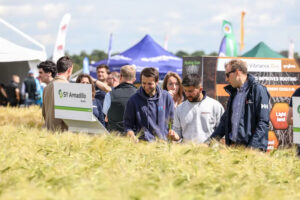
The crop plot area at Cereals 2023 is larger than last year, with both returning and new exhibitors.
So, what can visitors expect from the crop plots at this year’s event?
KWS
KWS has four new winter wheats, two new hybrid oilseed rape varieties and a new hybrid winter barley, which is currently the highest yielding in NL2 trials. “It’s very exciting, with very good disease resistance and standing ability,” said Olivia Potter, technical specialist at KWS.
Spring milling wheats KWS Ladum and Alicium will also be in the ground. “There are no new high quality winter milling varieties, so it’s good to have some new high yielding spring varieties coming through.”
DSV
A mix of old favourites and new varieties will feature on the DSV stand, including Champion winter wheat and its descendant Oxford, which has a more consistent yield, stiffer straw and good resistance to both yellow rust and orange wheat blossom midge. “It’s a farmer-friendly variety,” said arable technical manager, Andy Hartley.
Farmers can view a range of Clearfield oilseed rape varieties, including Beatrix, a new unnamed high-yielding variety, and the hybrid Dolphin. “And we’ll be launching a new phoma blocking gene; Rlm7 is breaking down a bit so this is an improvement, and some varieties are now in NL2 testing.”
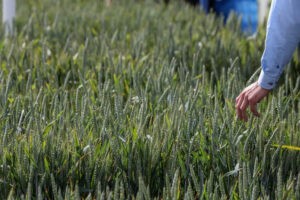
Natural England
Conservation mixes, regenerative farming and soil health will be the focus on Natural England’s stand, with enhanced autumn and winter bird seed mixes, pollinator mixes, and cover crops. These will include a clover living mulch for undersowing cereals, maize and oilseed rape, explained Mark Taylor, senior Catchment Sensitive Farming officer.
“Farming is changing, and as we move away from the Basic Payment Scheme a lot of people will be looking at ways to reduce inputs or generate extra money through environmental stewardship.”
LSPB
Oilseed rape growers will be keen to see LSPB’s Vegas, Murray and Flemming, which are new to the Recommended List, as well as some unnamed varieties still in the national listing process. “The new varieties benefit from RlmS phoma resistance and farmers can see the stay-green effect that has,” said pulse product manager Michael Shuldham.
Peas and beans will also be planted, including Carrington, which brings a new yield level to the pea market, and Yukon, a spring bean with very early maturity for growers further north.
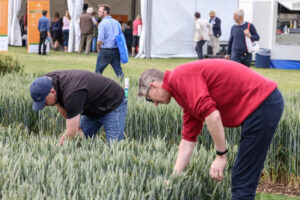
PGRO
Cultural pest management will be PGRO’s focus this year, demonstrating the trials work it has been carrying out for the past two years. It will feature vetch, lucerne and winter bean trap crops, sown alongside spring beans to attract damaging beetles.
“We’ve had really positive results, especially with early sown bean trap crops as they draw the pests in and keep them there,” said research and development manager, Becky Howard. “We’re also looking at the impact the crops have on aphids and beneficial insects.”
Optiyield
In a first for the Cereals Event, one set of plots is being taken right through to harvest as a working replicated trial. Optiyield will be comparing applying Consortium Plus, a mix of beneficial soil microbes and biostimulants, with or without foliar nutrients and biostimulants throughout the growing season. The control will receive a standard fertiliser programme.
“Our foliar nitrogen can be applied at full rate without any scorch, giving 95% nutrient use efficiency,” explained CEO Simon Fox. It also works in dry conditions, unlike prilled fertiliser, and reduces losses into groundwater or the air.
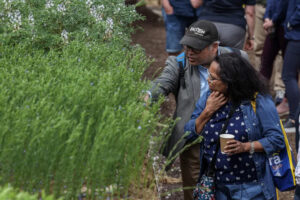
Rothamsted Research
Visitors will have a rare chance to see some of the Watkins lines of wheat – grown from samples collected in the 1920s – in the ground at the Rothamsted plot. “We are applying different rates of nitrogen fertiliser and looking for traits that might be useful to breed into modern varieties to reduce the need for inputs,” explained head of communications, James Clarke.
The organisation is also looking at herbal leys, cover crops and reduced tillage to build soil carbon, in order to give practical advice to farmers looking to implement such techniques.
Premium Crops
Growers looking for something a bit different will find a range of alternative crops at Premium Crops’ site, including spring and winter linseed, high omega 3 varieties, high erucic acid rapeseed, high protein spring wheat, naked oats and spelt.
“We will also have a cover crop mix selected to be a precursor to spring linseed or canary seed,” said seeds and marketing manager, Nigel Padbury. “People are looking at cover crop mixtures and need to be careful what’s in them if growing spring linseed or canary seed. They need a fine seedbed, and many cover crops have a lot of dry matter, which is difficult to incorporate.”
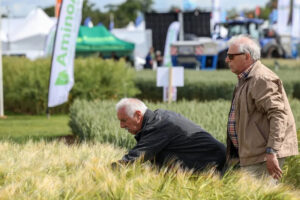
Bionature UK
Foliar nutrition and micronutrients are becoming increasingly popular, and Bionature will be growing oilseed rape and winter wheat trials treated with varying rates of Delta K liquid fertiliser and Tiptop 20.20.20, compared against standard fertiliser treatments. “We’re pushing for rooting, stem strength, tillering and biomass,” said partner Steve Mowbray.
“Our products are based around NH2 not the normal NH3, as the plant uses less energy to take it up. It’s very cost effective and environmentally friendly, with no leaching or volatilisation, as uptake and conversion is very fast.”
AminoA
Seed treatments are another area of interest, and AminoA is growing oilseed rape, triticale and winter wheat plots treated with STAART versus untreated plots. “We did a demo last year and the oilseed rape had more pods and more seeds per pod, while the wheat and triticale had more ears/m2,” said managing director Richard Phillips.
The firm is also looking at the impact of artificial nitrogen on soil microbiology. It’s running trials using up to 150kg/ha of nitrogen with a range of products containing amino acids, biostimulants and nutrients. “Treated plots were friable with reasonable microbe levels, even at 150kg/ha of nitrogen. But the conventional plots with 220kg/ha were hard to dig and had no protozoa. It’s so important to maintain the soil microbiology.”

Syngenta
The ever popular birds and bees pollination mix will provide the photogenic backdrop to the Syngenta Sprays and Sprayers arena. Syngenta’s stand will also feature low and no-till cultivation trials, a new BYDV tolerant hybrid barley and a new winter milling wheat.
The company will be unveiling findings from the nitrogen reduction and nitrogen use efficiency work with hybrid barleys. And visitors can also take a look at its new 3D90 nozzle, which is the next step in nozzle technology and drift reduction. As ever, the prestigious Farm Spray Operator of the Year Award will be presented at the event, for which applications are now open.
